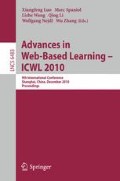Abstract
A Personal Learning Environment (PLE) is a mash-up of learning services. It enables students and teachers to assemble a work environment that is adapted to a domain and specific individual needs. In this article, we report on our experiences on using a PLE for Language Learning in five French lectures at the Shanghai Jiao Tong University Continuing Education School. We found that while a PLE has the potential to simplify access to and usage of Web sites and services for language learning, students will use it only if properly motivated. Furthermore, at the time being, difficulties that result from the user interface and technical implementation make the interactions with PLEs difficult. The problems need to be overcome in order for PLEs to become adopted by the average, not technically highly literate students and teachers.
Access this chapter
Tax calculation will be finalised at checkout
Purchases are for personal use only
Preview
Unable to display preview. Download preview PDF.
References
Anderson, T.: PLEs versus LMS: Are PLEs ready for Prime time? (2006), http://terrya.edublogs.org/2006/01/09/ples-versus-lms-are-ples-ready-for-prime-time/ (Date retrieved April 18, 2010)
Blees, I., Rittberger, M.: Web 2.0 learning environment: Concept, implementation, evaluation. eLearning Papers 15 (2009)
Chatti, M.A., Jarke, M., Frosch-Wilke, D.: The future of e-learning: a shift to knowledge networking and social software. IJKL 3(4/5), 404–420 (2007)
Downes, S.: E-learning 2.0. eLearn (10) (2005)
Drachsler, H., Hummel, H.G.K., Koper, R.: Personal recommender systems for learners in lifelong learning networks: the requirements, techniques and model. International Journal of Learning Technology 3(4), 404–423 (2008)
Gillet, D., Law, E.L.C., Chatterjee, A.: Personal learning environments in a global higher engineering education web 2.0 realm. In: 1st IEEE Engineering Education Conference (EDUCON), Madrid, Spain (2010)
Helou, S.E., Salzmann, C., Sire, S., Gillet, D.: The 3a contextual ranking system: simultaneously recommending actors, assets, and group activities. In: Proceedings of the 2009 ACM Conference on Recommender Systems, RecSys 2009, October 23-25, pp. 373–376. ACM, New York (2009)
Law, E.L.C., Nguyen-Ngoc, A.V.: Fostering self-directed learning with social software: Social network analysis and content analysis. In: Dillenbourg, P., Specht, M. (eds.) EC-TEL 2008. LNCS, vol. 5192, pp. 203–215. Springer, Heidelberg (2008)
Minocha, S.: A study on the effective use of social software by further and higher education in the uk to support student learning and engagement. Tech. rep., JISC, Bristol (2009)
Shen, L., Shen, R.: The pervasive learning platform of a shanghai online college - a large-scale test-bed for hybrid learning. In: Fong, J., Kwan, R., Wang, F.L. (eds.) ICHL 2008. LNCS, vol. 5169, pp. 178–189. Springer, Heidelberg (2008)
Ullrich, C., Borau, K., Luo, H., Tan, X., Shen, L., Shen, R.: Why Web 2.0 is Good for Learning and for Research: Principles and Prototypes. In: Proceedings of the 17th International World Wide Web Conference, pp. 705–714. ACM, New York (2008)
Vassileva, J.: Toward social learning environments. IEEE Transactions on Learning Technologies 1(4), 199–214
Wilson, S., Liber, O., Johnson, M., Beauvoir, P., Sharples, P., Milligan, C.D.: Personal learning environments: Challenging the dominant design of educational systems. In: Proceedings CEUR Workshop, vol. 213, pp. 173–182. CEUR-WS.org (2006)
Zhang, J.: A cultural look at information and communication technologies in eastern education. Educational Technology Research and Development 55(3), 301–314 (2007)
Author information
Authors and Affiliations
Editor information
Editors and Affiliations
Rights and permissions
Copyright information
© 2010 Springer-Verlag Berlin Heidelberg
About this paper
Cite this paper
Ullrich, C., Shen, R., Gillet, D. (2010). Not Yet Ready for Everyone: An Experience Report about a Personal Learning Environment for Language Learning. In: Luo, X., Spaniol, M., Wang, L., Li, Q., Nejdl, W., Zhang, W. (eds) Advances in Web-Based Learning – ICWL 2010. ICWL 2010. Lecture Notes in Computer Science, vol 6483. Springer, Berlin, Heidelberg. https://doi.org/10.1007/978-3-642-17407-0_28
Download citation
DOI: https://doi.org/10.1007/978-3-642-17407-0_28
Publisher Name: Springer, Berlin, Heidelberg
Print ISBN: 978-3-642-17406-3
Online ISBN: 978-3-642-17407-0
eBook Packages: Computer ScienceComputer Science (R0)

